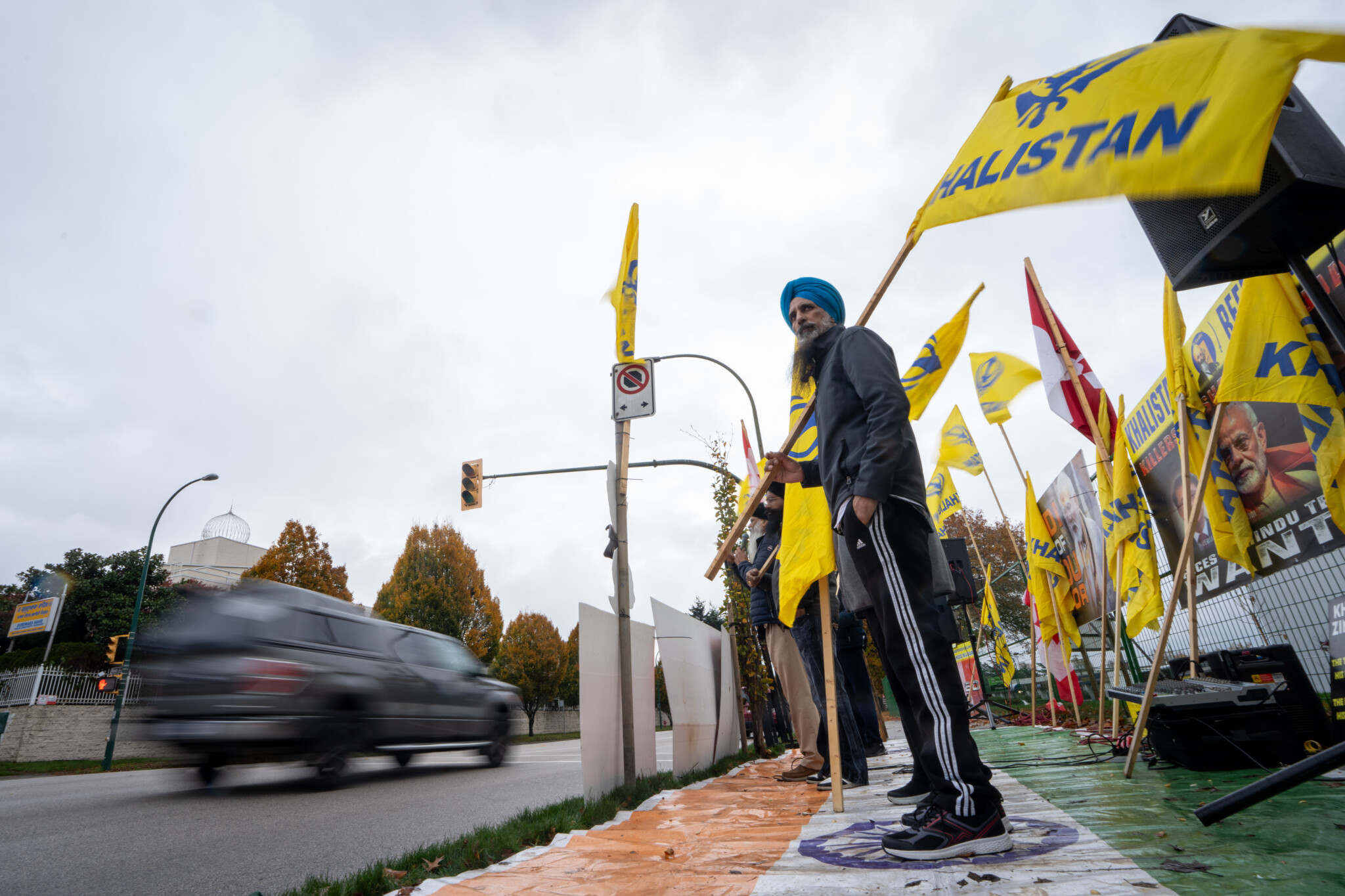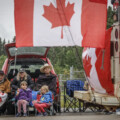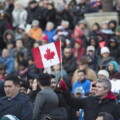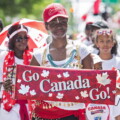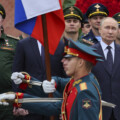Last weekend a foreign conflict spilled out onto Canadian streets as Khalistani activists, a small subset of the Sikh diaspora who want to see India’s Punjab region become an independent Sikh state, held rallies outside Hindu temples across the country. They were protesting Indian consular officials being hosted at their places of worship.
The demonstrations came amidst heightened tensions between Canada and India, following incredible allegations from the Canadian government involving interference and assassinations levelled against Indian Prime Minister Narendra Modi’s Hindu nationalist government.
Videos posted to X showed Khalistani extremists breaching the Hindu Sabha Mandir temple property in Brampton, Ont., and chasing Hindu counter-protesters who had shown up to defend their place of worship. Footage also showed opposing groups exchanging blows and striking one another with flagpoles.
Pro-Khalistan protest outside Hindu temple in Brampton (1st video).
Later, some protesters attacked worshippers with sticks & entered the temple grounds to continue attacking (2nd video).@PeelPolice @patrickbrownont pic.twitter.com/bPQpEd8L2b
— Darshan Maharaja (@TheophanesRex) November 3, 2024
Later that evening, members of the Hindu community held a counter-protest at the Mississauga’s Westwood Mall, where a police officer attempting to control the crowd was injured. Pro-India Hindus also staged a protest in front of the Sri Guru Singh Sabha Malton, a Sikh place of worship in Mississauga.
Similar scenes were seen in Surrey, B.C., on Sunday. The violence carried on into Monday night.
The Israel-Hamas war has also sparked unrest on Canadian streets.
Pro-Hamas demonstrations have occurred weekly since the Oct. 7, 2023 attacks on Israel, with protesters chanting slogans like “Long live October 7th,” and “Long live the Intifada,” as well as “Explode the head of zionists,” “Death to Canada,” and others praising Hamas leadership. Anti-Israel protesters in Canada have targeted Jewish synagogues, Jewish community centres, and Jewish neighbourhoods.
There are peaceful protests and then there is this.
A Toronto synagogue was vandalized a few weeks ago, so the community came together to their holy place for “An Evening of Solidarity Against Hate.”
FreePalestine protesters showed up to stand against the Jewish community, and support hate. pic.twitter.com/OX80P1VplR
— Hen Mazzig (@HenMazzig) August 1, 2024
This situation highlights a concerning reality: Canada is witnessing diaspora grievances increasingly being expressed on its soil.
“Our national imagination gets carried off to different lands, part of the population is living psychologically elsewhere,” president of the Institute for 21st Century Questions Irvin Studin told The Hub.
Not only have our politicians allowed this to happen, but they have played into it.
“Politicians pretend to sympathize with that psychology for electoral gain,” Studin said.
I attribute this largely to Prime Minister Justin Trudeau’s “post-national” ideology, his government’s large-scale immigration agenda, and a growing focus on diaspora politics across party lines.
Trudeau’s Canada: a “post national” state with no core identity
Shortly after taking office, Trudeau radically redefined Canada’s national identity by declaring to the world that Canada is a “post-national” state with no core identity.
“There is no core identity, no mainstream in Canada. There are shared values—openness, respect, compassion, willingness to work hard, to be there for each other, to search for equality and justice. Those qualities are what make us the first [post-national] state,” Trudeau told The New York Times in 2015.
Throughout his time in office, Trudeau has also emphasized that “diversity is our strength.”
“Diversity has become our great strength.” – Justin Trudeau pic.twitter.com/hKD8e70hVq
— Global Citizen ⭕ (@GlblCtzn) September 23, 2017
At the same time, he opened the floodgates to record levels of rapidly increasing immigration. In 2023 alone, Canada welcomed more than a million immigrants, including 471,771 permanent residents, and 804,901 non-permanent residents. Until recently when they announced significant cuts to Canada’s Immigration targets, the Liberals had been planning to increase immigration numbers further.
The Liberal government also made it easier for newcomers to obtain Canadian citizenship, then diminished the value that came with that piece of paper and our passports.
A multi-partisan fixation with diaspora politics
Amidst this redefinition of Canada as a “post-national state” with no core identity, with large-scale immigration exploding and difference being touted as our biggest strength, the federal Liberals, along with the NDP, Greens, and even the Conservatives, have increasingly embraced diaspora politics.
It should be noted that engagement with Canada’s ethnic communities is not a new practice for politicians. There is certainly value in connecting with Canadians of diverse backgrounds by attending community events to meet the voters where they are at and talk about their party’s general platform. However, the line is drawn when politicians pander to these groups with pandering discourse and proposals are contrary to the greater Canadian interest.
With the emergence of chaos, disorder and violence, the approach taken in this last year has fundamentally changed things.
The causes of diaspora groups—including radical issues that should have been left behind when members of these communities immigrated to Canada—are now being prioritized over Canadian values and interests, in both domestic and foreign policy. The pandering has reached a whole new low.
Last fall, after being heckled at a mosque and facing pressure from top Muslim Liberal donors, Trudeau’s government began supporting a ceasefire in Gaza and voted against Israel at the UN, breaking with Canada’s long-standing support for the Jewish state—a move praised by Hamas. The Liberal government also imposed a freeze on new arms export permits to Israel and sanctions on “extremist Israeli settlers” in the West Bank.
When asked about this shift by former NDP leader Thomas Mulcair, Foreign Affairs Minister Mélanie Joly said “[H]ave you seen the demographics of my riding?”
In 2019, the Trudeau government changed the “Public Report on the Terrorism Threat to Canada,” removing a direct reference to Sikh extremism, following lobbying from activists who warned Trudeau that he would be banned from Sikh community events if he did not act.
That same year during his infamous state visit to India, the PMO invited Khalistanti terrorist Jaspal Atwal to a private reception. Liberal MP Sukh Dhaliwal meanwhile recently sponsored a petition calling on Canada to re-evaluate the Air India bombing case to investigate whether the Indian government was behind it.
Last year, Trudeau accused India of assassinating Khalistani activist Hardeep Singh Nijjar—an allegation for which some alleged he had no “hard evidentiary proof” for at the time. Police have since charged four Indian nationals over Nijjar’s death. While the situation is serious and I unequivocally believe that Canada must defend its sovereignty, experts have criticized the handling of this issue, suggesting it has been heavily influenced by diaspora politics, with the Trudeau government’s seeming unwillingness to take Khalistani extremism seriously. It’s also sent Canada’s relationship with one of the world’s largest economies into a tailspin.
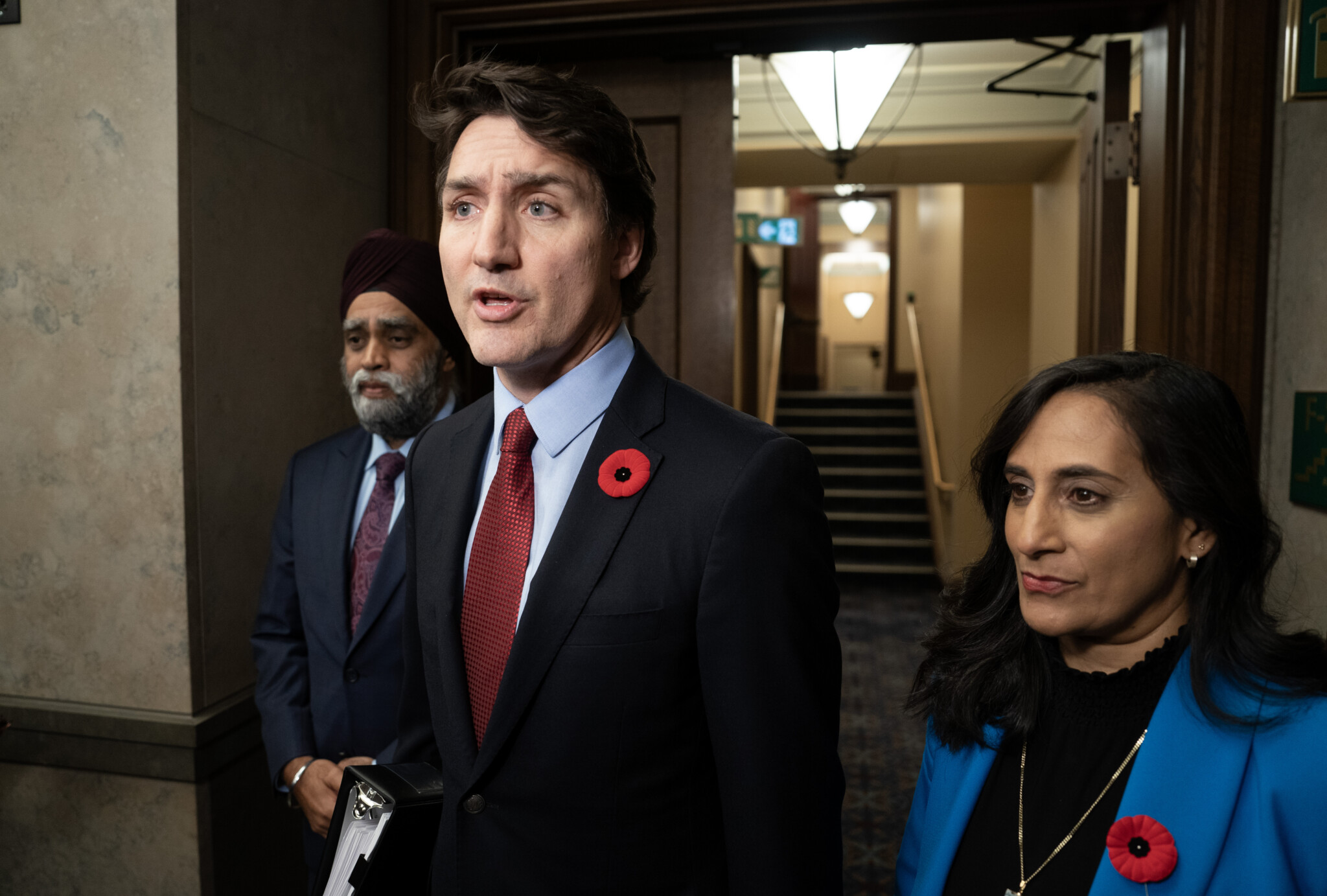
President of the King’s Privy Council for Canada and Minister of Emergency Preparedness Harjit Sajjan and President of the Treasury Board and Transport Minister Anita Anand stand next to Prime Minister Justin Trudeau as he speaks about Sikh violence, Nov. 5, 2024 in Ottawa. Adrian Wyld/The Canadian Press.
Meanwhile, the NDP has also leaned heavily into diaspora politics. During a recent by-election, their candidate, Craig Sauvé, had campaign flyers featuring a Palestinian flag instead of a Canadian one, accompanied by the slogan “Stop the genocide in Gaza.”
The same goes for the Green Party, whose leader Elizabeth May said she gets her “marching orders” from Palestine’s Canadian representative.
And while Conservative Party leader Pierre Poilievre has been praised for an ethnic outreach strategy aimed at “[uniting] Canada’s diverse communities,” which includes his “blue seal” plan to recognize foreign credentials and promote the Canadian dream, he has also been accused of veering into problematic forms of diaspora outreach, especially with Canada’s growing South Asian population.
At the Sikh Khalsa Day Celebration 2024 in Toronto, Poilievre said his prospective government would “rely on the great Sikh values that Guru Gobind Singh brought forward.” The Conservative Party website also has a petition calling for direct flights to Amritsar, a Sikh-majority city in India. Poilievre has also expressed his opposition to the deportation of Indian international students with fraudulent admission letters.
Diaspora politics are compromising Canada’s national unity
Canada was once hailed worldwide for its success in integrating immigrants. Newcomers arrived from around the globe, with the expectation that they were to leave behind the quarrels of their home countries and embrace a Canadian way of life.
But what is the Canadian way of life when the prime minister says there is no national identity?
Canadian diasporas are increasingly told it is okay to stay in their “tribes,” while the political class increasingly views ethnic communities as distinct voting blocs, each with its own priorities and expectations of government.
Joe Adam George, a research analyst in national security and foreign policy at the Macdonald-Laurier Institute and former ethnic press secretary to Conservative leaders Poilievre and Candice Bergen, told The Hub that diaspora politics are “compromising our national unity.”
George, who was born in India, explained that “when you do not exemplify Canadian values or what Canada stands for, the culture of Canada, and you do not do anything to try to get people integrated and to educate them as part of the Canadian system, you inevitably are going to have people going about doing their own things and sometimes even romanticizing values that are not in line with Canadian values.”
All is not lost, however. He believes that “immigrants still have a desire to integrate” but that “they’re not sure how to do it [as] there are no clear expectations of them” under Trudeau.
“Diaspora politics are confusing us and not allowing us to advance a proper national interest in any respect, and are debilitating against the formation of real Canadian politics, Canadian identity, Canadian consciousness, and sensibility,” Studin, a member of the Jewish diaspora, told The Hub “We assume very dogmatic positions about the diasporas and then militate against real Canadian positions.”
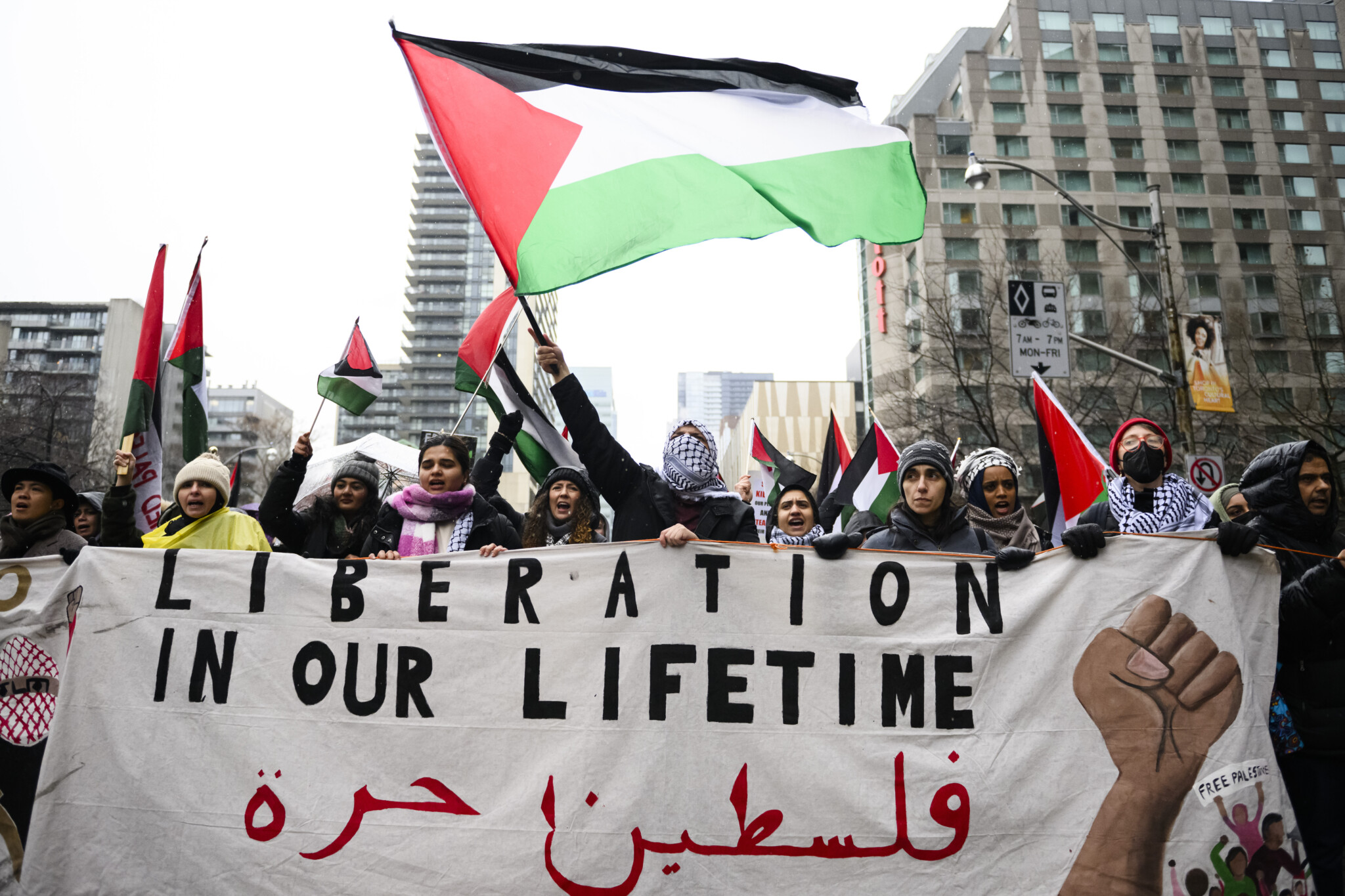
Demonstrators shout slogans in protest of Israel’s continued attacks on the Gaza Strip, in downtown Toronto, Dec. 23, 2023. Christopher Katsarov/The Canadian Press.
Harming Canada’s relationships on the world stage
In addition to harming Canada’s national unity and fueling ethnic grievances at home, the prioritization of diaspora politics has also damaged Canada’s reputation on the world stage.
Canadian leaders are now making foreign policy decisions aimed at pleasing domestic diaspora communities, rather than at maintaining relationships with our allies.
“Most of the time when I see the prime minister go abroad, he’s not speaking to foreign audiences. He’s not even speaking to a national Canadian audience. He’s speaking to diaspora audiences at home, and I think this has led him to make major missteps,” said Brian Lee Crowley, head of the Macdonald-Laurier Institute, in an interview with the National Post.
As my Hub colleague Alisha Rao wrote, when it comes to India, its “longstanding criticism of Canada is rooted in its belief that we are willing hosts to extremist Khalistani elements, and in allowing these separatist movements the freedom to organize, Canada is tolerating terrorism. India sees Canada as prioritizing these sub-diasporic interests over the concerns of the Indian government, not taking them seriously in the way many of our allies are.”
Canada has also damaged its reputation with Israel—a close ally—in an effort to appease diaspora communities. Former Israeli prime minister Naftali Bennett said he was “disappointed” in Canada’s move away from long standing support. Member of Knesset Sharren Haskel, and a Canadian, meanwhile accused Canada of having “completely lost its moral compass.”
Ethnic outreach can no longer come ahead of Canadian interests
Ethnic outreach was part of Canadian politics before Trudeau took office and will continue to be part of our politics as Canada’s demographics change and the country becomes more diverse. However, the way it is conducted today must change, unless we want to further descend into division and chaos.
Under the previous Conservative government, then-minister of citizenship, immigration and multiculturalism Jason Kenney successfully increased Conservative support among ethnic communities, without compromising Canadian values or interests.
Kenney took time to engage with immigrant communities, aiming to convince them they shared values with the Canadian-born small-c conservative base. He promoted policies that he believed were popular not just with these communities but also other Canadians, including law enforcement and public safety measures.
What he did not do was tolerate extremism. In 2013, Maclean’s reported that Kenney walked out of a Sikh event due to unexpected Khalistani rhetoric, telling an organiser, “This is not a civilised way to behave” and revoking what could have been a visit from prime minister Stephen Harper.
It’s a hard-line approach that should be adopted by all parties when engaging with ethnic communities.
Immigration has been essential to Canada’s growth, and newcomers should be encouraged to retain the best aspects of their culture—their language, religion, food, music, and fashion.
Studin noted, “I am of the diasporas. I love the diasporas.” But “they have nothing to do with the national interest. And it used to be that they understood that and we understood that very well.”
“You have to hold the line on that basic social compact in the country,” he added. “If you lose the line, which is very easy to do, then it’s very difficult to reconstitute.”
Our political leaders must reinstate the notion that immigrants leave behind ideas that conflict with Canadian values when they move to our great country. It’s a principle that was understood under previous governments, and one that must be restored.
We also need our elected officials to re-embrace a patriotic vision of Canada and re-assert that a core Canadian identity does exist.
Having a core identity has been foundational to Canada’s success for over 150 years. It should be our lodestar if we hope to have a country that remains strong and free for the next 150 years and beyond.
